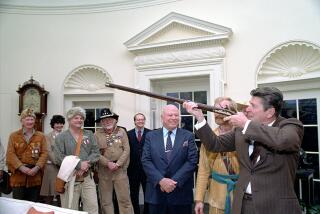NONFICTION - Aug. 24, 1986
- Share via
THE GREAT SOCIETY AND ITS LEGACY, edited by Marshall Kaplan and Peggy Cuciti (Duke University: $42.50, hardcover; $17.95, paperback; 252 pp.). For critics of the Great Society, its failures are readily explained as demonstrating the classic liberal fallacy of trying to solve problems by throwing money at them. In defense, liberals claim they did not throw enough money to fairly test their proposed solutions. The truth of course is much more complicated, as this illuminating compendium of essays demonstrates. Though most of the contributors are representative of the liberal faith in big government, which fostered Lyndon Johnson’s assault on poverty, the editors have achieved a measure of balance by including a few conservative voices.
Their collective efforts point up some of the dilemmas that undermined the Great Society--and still confront us today. Thus William Schambra of the American Enterprise Institute contends that the sense of “national community,” necessary for the success of such a crusade, can only be sustained in times of war or similar crisis. And yet, as the editors note, many analysts believe that a thriving economy also is “critical to the forging of a consensus to aid the disadvantaged.” All of which suggests that the circumstances under which significant social and economic progress can be made in this country are limited indeed.
This conscientious examination of the liberal past also serves as a useful guide to the conservative present--and to the as-yet unlabeled future.
More to Read
Sign up for our Book Club newsletter
Get the latest news, events and more from the Los Angeles Times Book Club, and help us get L.A. reading and talking.
You may occasionally receive promotional content from the Los Angeles Times.





